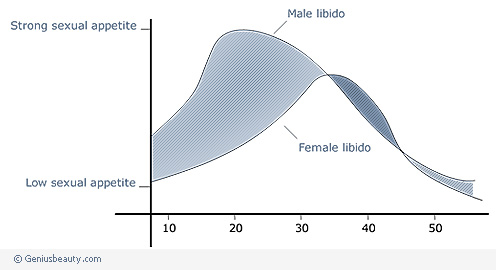The male sexual appetite is stronger, stays high for longer, and is focused primarily on a physical attractiveness, which tends to decay with time in women (in both sexes to be fair, but less dramatically in men).
On the other hand, the female sex drive is weaker, peaks during “child bearing” years, falling off dramatically over the age of forty, and tends to be more about non-physical qualities, many of which, such as power and success, increase in men as they age.
To illustrate this imbalance, I complied some data from several different sources to develop the following chart. It plots the male and female sex hormones with age, relative to their respective peak production:
The chart shows the average sex hormone production for men and women, by age, relative to their respective peak production. The blue line shows that testosterone production in men peaks around age 20 and gradually falls of, remaining relatively high until around 80 when it finally falls below 50% of the peak. On the other hand, estrogen production in women peaks in the 30s and falls off rather quickly thereafter, dropping below 50% of the peak at the onset of menopause, around age 50.
This chart is not meant to be an accurate clinical measurement of hormone production, or to argue that hormone production is the only influence on sexuality, but it does rather convincingly illustrate the fact that the sexual lifecycles of men and women simply don’t match up. Men stay -- for the lack of a better term -- horny, longer.
In my research, I also came across the following chart:
Believe it or not, this chart was being used to argue that women in their thirties and forties can’t be satisfied by men their own age (if you squint you can see the sliver of time where female libido rises above male libido). I don’t put too much stock in it since the article doesn’t site a data source, but it does follow the same general trend as my chart (and conspicuously ignores what happens after age 50).
But don’t take my word for it, listen to a doctor:
Unlike women, men experience hormonal changes gradually over a period of many years. A man’s testosterone level peaks around age 20, and then steadily declines from about 40 on, so ultimately it’s about 50% less by the time he is 80 years old.
With this in mind, should we as a society expect men to be monogamous to one woman for his entire life? Or should we as men accept an institution like marriage that mandates a commitment we know can only lead to being sexually unsatisfied?
You'd be better off using the strategy in my book!

